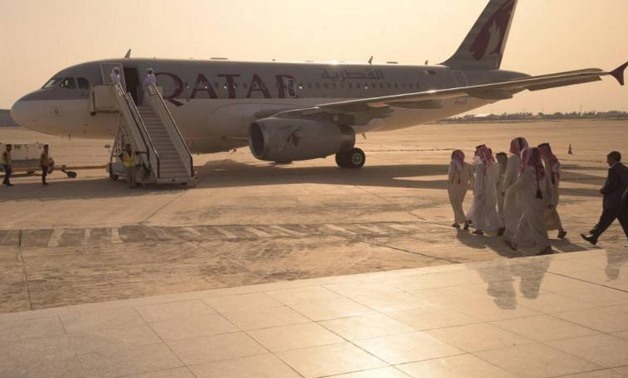
Hostages depart Baghdad International Airport in Baghdad, Iraq April 21, 2017. IRAQI INTERIOR MINISTRY/Handout via REUTERS
CAIRO – 13 June 2017: Qatar has negotiated with terrorist groups to release hostages, paying billions of dollars as ransom, according to recent reports by several media outlets and wires. While some view Qatar’s actions as a humanitarian act, political experts caution that the paying of such ransoms could be a covert funding method for these terrorist groups.
A documentary released by Sky News Arabia on Sunday examined several incidents in which Qatar was involved in such acts. In March 2014, the militant group al-Nusra Front in Syria freed 13 nuns it had kidnapped from a convent in the Syrian town Maaloula three months earlier. According to BBC, the nuns were to be exchanged for 150 Islamist women imprisoned by Lebanese and Syrian authorities.
As BBC reported, two militants from the Syrian city Yabroud claimed Qatar offered to pay $4 million, while al-Nusra Front demanded $50 million to release the kidnapped nuns.
In September 2014, Qatar gave millions of dollars to the same group so it would release 45 Iranian soldiers who were part of the peacekeeping troops in the Golan Heights. The 45 Iranian soldiers were released, according to Sky News Arabia.
Since the eruption of civil war in Yemen in 2011, Qatar has held deals with Houthis and Al-Qaeda to free hostages by paying extremely expensive ransoms and the exact figure was not mentioned. The hostages have included Arab, Yemeni and Western citizens, according to the New York Times.
In December 2014, Qatar negotiated with al-Nusra Front and the IS for the release of Lebanese soldiers and policemen, kidnapped in August of the same year, in return for Islamist captives in Syria and Lebanon. Although Reuters reported that the deal failed after the killing of one of the captives by Islamic State (IS) terrorist group, Sky News Arabia reported the deal was closed after Qatar paid millions of dollars in ransom. There were no further information on whether the Islamist captives were released or not, however the Lebanese soldiers and policemen were freed.
Qatar paid hundreds of millions of dollars (the exact figure was not mentioned)to an Iranian-backed militia for the release of 26 Qataris that were kidnapped on December 16, 2015 in southern Iraq and released in 2017, according to AP. The deal also involved that al-Nusra Front would allow the displacement of Shiite citizens from four Syrian towns early in 2017, AP reported.
Egypt asked the U.N. Security Council in April 2017, the same month Qatari hostages in Iraq were freed, to investigate reports that Qatar “paid up to $1 billion to a terrorist group active in Iraq,” a charge which was denied by Qatar, according to AP.
Qatar said it was only supporting the Iraqi state in releasing hostages. However, Iraqi Prime Minister Haidar al-Abadi denied such claims, stating that in fact Qatar ‘smuggled’ the money to Iraq, as Al-Hayat newspaper reported.
Abadi stated Iraqi authorities confiscated bags containing hundreds of millions of dollars brought on a private Qatari jet which landed in Baghdad in April 2017.
According to Al-Hayat newspaper, Abadi indicated that was part of the deal in exchange to release the 26 Qatari hostages, without the permission of the Iraqi government.
Holding negotiations with terrorist groups is a refuted practice in the international arena, because it would encourage such groups to continue kidnapping people in exchange for ransom, which would be allocated to launch further terror attacks. Also, negotiating with terrorists may give their acts or even their presence a legitimacy, which is unacceptable.
Several Arab and non-Arab countries have refused to pay any ransoms, hold any negotiations on hostages or any other subject matter with the IS since its rise in 2013 and the beginning of beheadings in 2014. These countries consist of the U.S., the U.K., Egypt, Jordan, Japan, Syria, Iraq and others.


Comments
Leave a Comment